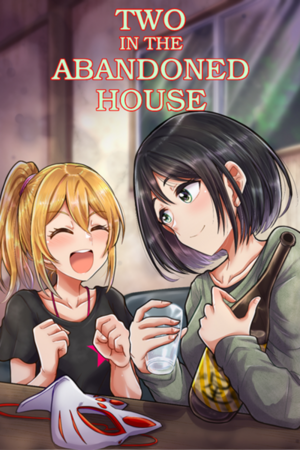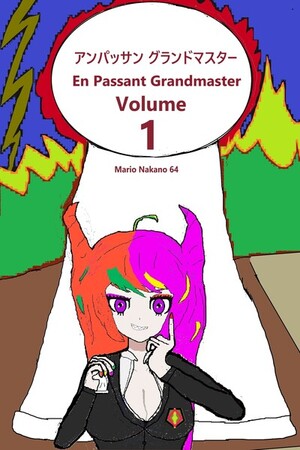Chapter 21:
/ Nature /
Parallel in Two
Arufa and Locri trailed behind Ghiles, his coat fluttering in the low laboratory fog. With every step they took came a small clang; in their metallic outfits, they seemed almost like androids.
The three of them trekked through the dim hall, glossy floor reflecting the wires on Arufa’s body. They’d left White and the others behind—as it turned out, their cells were nowhere near the other two.
“God, how do you even do anything here?” Locri said. “It’s all the same. Long, dark hallways you can barely see.”
“Give it six years, and you’ll know where everything is with your eyes closed,” Ghiles replied.
They rounded a corner, and Arufa saw a larger room up ahead, filled with blinking electronics. It looked nothing like her cell—she assumed they were just passing through it.
“White said no follow-up questions,” Arufa began, “but I’m really curious. Why’s it called the Many-Worlds Project?”
“If I offered you an explanation, I’d still be talking when we reboot the simulation. And she did say no follow-up questions. You got the answer you asked for.”
Locri grunted and brushed a lock of black hair out of her face. “That’s bullshit. We’re gonna forget anyway. Just tell us.”
Walking into the large room, Arufa was stunned by the array of computers lying about. Machines lined the walls, flickering on and off. A central office laid above the technology with two extra pods, presumably for the scientists.
There’s a massive device on the far end of the room with fog leaking out. That’s probably what’s making this place so cold—but what is it…?
“I’ll take any other questions, just not that one. There are cameras around here. She’d know if I said anything.”
“Great,” Arufa said quickly, pointing a finger towards the aforementioned device. “What’s that?”
Ghiles snickered. “Out of everything you could’ve pointed to…”
“Well, clearly it’s not just a terrible AC unit, so tell us.”
“It has to do with the MWP,” he replied. “It’s called the Transversal. It’s the most advanced quantum computer in the world.”
“And why is it leaking smoke, then? Is it broken, or what?” Locri questioned.
“Quantum computers have to be chilled to near absolute zero to work properly. Even the smallest disturbance, the vibration of an atom, can make them unreliable. That’s why it’s been so cold throughout the lab; a lot of what we do here involves computers like that.”
Arufa raised a brow. “And what makes that one so advanced?”
“I–” Ghiles held his tongue, glanced around, and shook his head. “I shouldn’t answer that.”
“You know what, doesn’t matter. I have a better question,” Locri said.
“And that is?”
“Why are you always looking around like someone’s out to get you?”
Arufa smiled. Stole the question I was about to ask. He’s been doing it since I met him in X2—it’s throwing me off big-time.
As he thought of a response—or maybe just continued in silence—they passed into another hallway. Arufa wasn’t sure how much more time they’d have to question him before it was all over.
Finally, Ghiles spoke. “Let me ask you a question. How much of this conversation do you remember?”
“Um, all of it, dipshit.”
“What was the question you just asked me?” he replied.
“Wha– do you have dementia?” Locri spat. “I asked why you’re always looking around like a schizo.”
Ghiles laughed under his breath. “That’s not what you asked. You asked, and I quote, ‘why are you always looking around like someone’s out to get you?’.”
“Okay, big deal. I changed the wording. What’s your point, hot stuff?”
“My point is, you only remember the ideas of a conversation, not the true conversation itself. Our brains choose to forget the details so we can save space.”
They rounded another corner, the smell of cleaning chemicals harsh on Arufa’s nostrils. Six years of this place would drive me insane. I’m kind of glad I thought I was in X2.
“Yeah, okay, great. Now answer the question,” Locri said.
“I am,” Ghiles replied, smiling knowingly. “I have what’s called eidetic memory. I can remember every detail about a conversation, a situation, or an environment, if I intentionally commit it to memory.
“The reason I look around so much is easy. I’m trying to remember as much as I can. I don’t want to lose those details everyone always forgets, because the way I see it, to exist is to remember.
“Everyone’s had a thousand conversations they don’t remember, seen a million faces they’ll never know. Whatever it is, if you don’t remember it, it essentially never happened to you. If no one remembers it happening, it’s as if it never happened at all.
“That’s why. Our memories are what define us. They’re the only way we learn and grow. They’re the only reason we act the way we do. And I know that’s true, because I watched you two become entirely new people without your memories.”
His talk was long enough to bring them to their cells—labeled ‘3’ and ‘4’, adjacent to each other, identical in every sense but the subject they housed. Arufa thought long and hard about what he’d said.
Our memories are what define us. To exist is to remember. But if he really cared about that, why would he go to such lengths to take our memories away? Why is he about to do it again? He doesn’t strike me as the self-centered type—why is his entire thought process egocentric?
If he just wanted to prove his philosophy right, he did that. It’s over, the example’s been made. So… why continue the study? Does he even want to continue it? Or maybe White is forcing him to.
Ghiles leaned over to access a small computer screen between the chambers. It seemed he was priming the pods to function again—Arufa decided now would be the time to ask.
“Dr. Ghiles,” she began.
“What’s on your mind, Arufa?”
“You said our memories are what define us, right?”
He nodded. “That’s exactly what I said. What about it?”
“You know that’s true. You’ve seen us. We’re the answer to your question. So why are you putting us back in there?”
Ghiles stopped typing and looked over his shoulder. He took a moment searching for a response, then sighed. “The truth is, you’re both terrible people.”
“Yeah, I know, thanks for rubbing it in. But the simulation–”
“You don’t get it. You’re starting to remember bits and pieces, right? Of who you were before?”
She lowered her head. “…Yeah.”
“The simulation isn’t a permanent fix. Unless we’re constantly wiping your memory, it eventually comes back. Your consciousness is like memory foam. We can mold it all we want, but it’ll always just end up like it was before.”
“So you think people don't change?” Locri snapped. “Maybe I killed someone before all this, but–”
“People do change. Serial killers and terrorists don’t. It’s in your nature.”
Ghiles got up from the computer and faced the two subjects with a menacing stare. Arufa now felt the guilt burdening her further, for actions she’d never even known until now.
“Arufa, you killed at least a dozen children in a terrorist attack, from what Dr. White told me. Locri, you killed over a hundred people at your own leisure, hunting for sport. You’re some of the sickest, most twisted people who ever lived.
“It was a miracle our experiment worked so well. But playtime’s over in the real world. If we let you go, you’d be just as much the menaces you were before. And I don’t want this company to have more blood on its hands than it already does.”
The scientist turned around and continued typing, leaving Arufa and Locri in a mix of shock and despair. I’m a terrorist. That’s what those memories are. That’s what those screams are.
I remember feeling guilt, at least. Like it wasn’t my fault. But maybe that’s just my better self plastering it on to make me feel better. It doesn’t matter who I am right now—I’ll just end up the same way I was.
But… will I really? That seems stupid. Sure, we get our memories back eventually. But X2 is part of our memories. I’d like to think my life there has made me into a better person than whoever I was before.
If I just remembered it all, I could prove to Ghiles I can change. If I can just find some record of everything I was, everything I did, I’ll be free. I don’t want to live a lie, even if I’m a better person for it.
“Ghiles,” Arufa said again. As she spoke, she creeped over to Locri, grabbed her by the hand, and began to walk backwards. Locri immediately understood.
“What?” he replied, still focused on the computer.
“Do you think our memories make us human?”
He kept typing. “…I would say so, yeah.”
Inching further and further away, Arufa raised her voice to create the illusion of being stationary. “Then I have a question for you.”
“Last one.”
“If you’re taking away our memories, even if it’s making us better people… isn’t that stripping us of our humanity?”
“…”
“You don’t think we can change, but you won’t give us the chance to. You can spout your philosophy all you want; you’re taking away what ‘defines us’ and replacing it with made-up bullshit. And somehow you don’t think that made-up bullshit can change us.
“Well, I’ll tell you what. I think it can. I think it will change us. I’m just gonna have to take that chance for you.”
Arufa tapped Locri and immediately pushed off the ground into a sprint. Even though her legs were weak, the rush of adrenaline kept her from stumbling. By the time Ghiles turned around in confusion, they’d already rounded the corner.
Now we’re on the run. All we have to do is find out who we really were. The only problem is, I don’t know where to start—but somehow, I’m confident we’ll figure that out.
What I’m really worried about, though, is whether it’s even possible to go against your nature. Ghiles said we couldn’t change, but we won’t know whether he’s right until we test that theory.
I guess that makes our little escapade a sort of experiment, doesn’t it?
![Parallel in Two [Saga Cover]](https://honeyfeed-novel-images.s3.amazonaws.com/uploads/novel_image/file/19959/cover_thumb_b4b8f013-ea32-4c39-83f9-8361adc49b89.jpeg)



Please sign in to leave a comment.